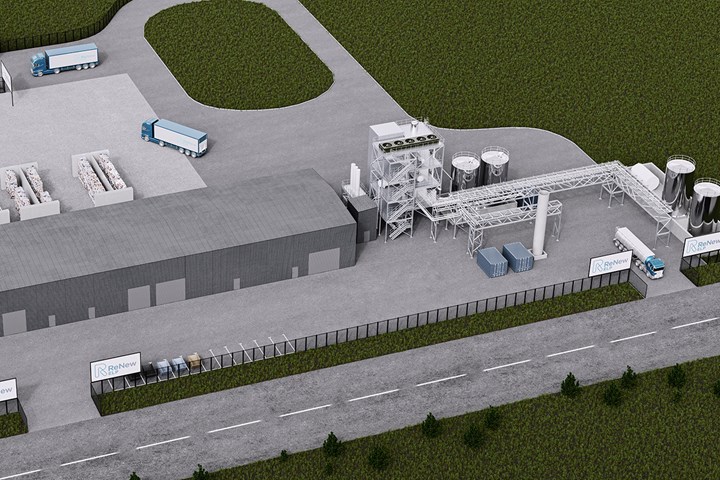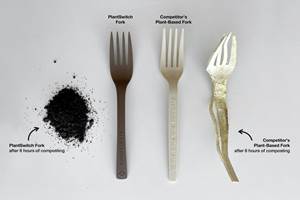Supercritical Steam Process Can Convert All Plastic Waste to Virgin Materials
Mura Technology’s HydroPRS process creates raw ingredients for infinitely recyclable new virgin-grade products from all types of plastic.
U.K.’s Mura Technology is pioneering a globally scalable solution to recycle all forms of plastic waste into virgin-grade plastic, reduce CO2 emissions and feed a sustainable “circular” plastics economy in the next decade. ReNew Elp is currently constructing the world’s first commercial-scale plant in Teeside, U.K., backed by global partners and the U.K. government. The plant is expected to be operational by 2022.
Mura’s proprietaty HydroPRS utilizes the Catalytic Hydrothermal Reactor (Cat-HTR), a technology developed and owned by Licella Holdings Ltd., which breaks down plastics using water in the form of supercritical steam (water at elevated pressure and temperature). The steam acts like molecular scissors, cutting longer-chain hydrocarbon bonds in plastics to produce the valuable chemicals and oils from which the plastic was originally made. This, in as little as 25 minutes. Using supercritical steam means the technology is also inherently scalable. Unlike other methods, which heat waste from the outside, the steam imparts energy from the inside, providing far more efficient conversion of plastic waste; a process which can be maintained regardless of scale.
This process reportedly can recycle all forms of plastic--including ‘unrecyclable’ products such as multi-layer, flexible plastics used in packaging,with no limit to the number of times the same material can be recycled. This means it has the potential to eliminate single use plastic and make the raw ingredients for a circular plastics economy, creating value, not waste.

Rendition of new Teeside (front) plant
The Teeside plant will be able to annually process 80,000 m.t. of plastic. It will form the blueprint for a rapid global rollout that will see one million m.t of capacity in development worldwide by 2025—reportedly equivalent to nearly half the plastic packaging waste produced in the U.K. each year. Sites are planned in Germany, the U.S. and Asia.
Said Dr Steve Mahon, CEO of Mura Technology, “We are at the tipping point of an environmental catastrophe--it’s time to seize the initiative and put an end to plastic pollution across the world. HydroPRS represents a win-win for the environment, economy and society, helping keep our environment free from plastic and oil where it belongs – in the ground. We need to act now and that’s why we’re taking a global-first approach--to scale fast and meet the challenge head on. We’re working with global partners to deploy our unique HydroPRS process where it’s needed, today, to create a sustainable future and eliminate plastic pollution.”
To support its rapid global deployment, Mura has announced a series of global strategic partnerships.
▪ In January, the company signed an agreement with engineering firm Houston-based KBR Inc. to license the technology to its clients worldwide. KBR has also invested in the company.
▪ Igus GmbH (U.S. office in East Providence, R.I.) has partnered with Mura via a strategic investment to support the first plant in Teesside. Multinational engineering firm Wood has been appointed as the EPC contractor for the Teesside project. The Teesside project is being developed by ReNew ELP, Mura Technology’s U.K. subsidiary.
Earlier this year, advanced recycling was for the first time recognized as contributing to government targets for recycled plastics and supporting measures such as the proposed plastic tax for recycled content in packaging.
Said Rebecca Pow MP, under-secretary of state for DEFRA (Dept. of Environment, Food & Rural Affairs), “The Government is committed to both clamping down on the unacceptable plastic waste that harms our environment and ensuring more materials can be reused instead of being thrown away. By investing in these truly ground-breaking technologies, we will help to drive these efforts even further, and I look forward to seeing them develop and deliver real results.”

Rendition of new Teeside (back) plant.
The concept has also been backed by environmental groups campaigning to tackle the plastic waste crisis. Said Jo Ruxton, founder of Ocean Generation and producer of Netflix documentary ‘A Plastic Ocean’, “More than eight million tonnes of plastic enters our oceans each and every year--that’s unacceptable. It’s paramount that we live more sustainably with plastic, reducing our need for it in the first place and then finding ways to stop it entering our precious environment. Technologies like this are a big piece of that jigsaw.”
Mura is in advanced discussions with global brands and investors to fund and deploy HydroPRS and use the raw ingredients it creates to eliminate the need for new virgin plastic, meeting consumer demand for action.
Said Mura’s Dr. Mahon,“The problem isn’t plastic, it’s where it ends up. We want to change the way the world thinks about plastics--not as something to throw away, but as a valuable resource that can be reused over and over without harming our natural world.”
Related Content
Part 3: The World of Molding Thermosets
Thermosets were the prevalent material in the early history of plastics, but were soon overtaken by thermoplastics in injection molding applications.
Read MorePrices of All Five Commodity Plastics On the Way Up
Despite earlier anticipated rollover in prices for most of the volume commodity resins, prices were generally on the way up for all going into the third month of first quarter.
Read MoreAdvanced Biobased Materials Company PlantSwitch Gets Support for Commercialization
With participation from venture investment firm NexPoint Capital, PlantSwitch closes it $8M bridge financing round.
Read MorePrices Up for PE, ABS, PC, Nylons 6 and 66; Down for PP, PET and Flat for PS and PVC
Second quarter started with price hikes in PE and the four volume engineering resins, but relatively stable pricing was largely expected by the quarter’s end.
Read MoreRead Next
People 4.0 – How to Get Buy-In from Your Staff for Industry 4.0 Systems
Implementing a production monitoring system as the foundation of a ‘smart factory’ is about integrating people with new technology as much as it is about integrating machines and computers. Here are tips from a company that has gone through the process.
Read MoreMaking the Circular Economy a Reality
Driven by brand owner demands and new worldwide legislation, the entire supply chain is working toward the shift to circularity, with some evidence the circular economy has already begun.
Read MoreSee Recyclers Close the Loop on Trade Show Production Scrap at NPE2024
A collaboration between show organizer PLASTICS, recycler CPR and size reduction experts WEIMA and Conair recovered and recycled all production scrap at NPE2024.
Read More


























